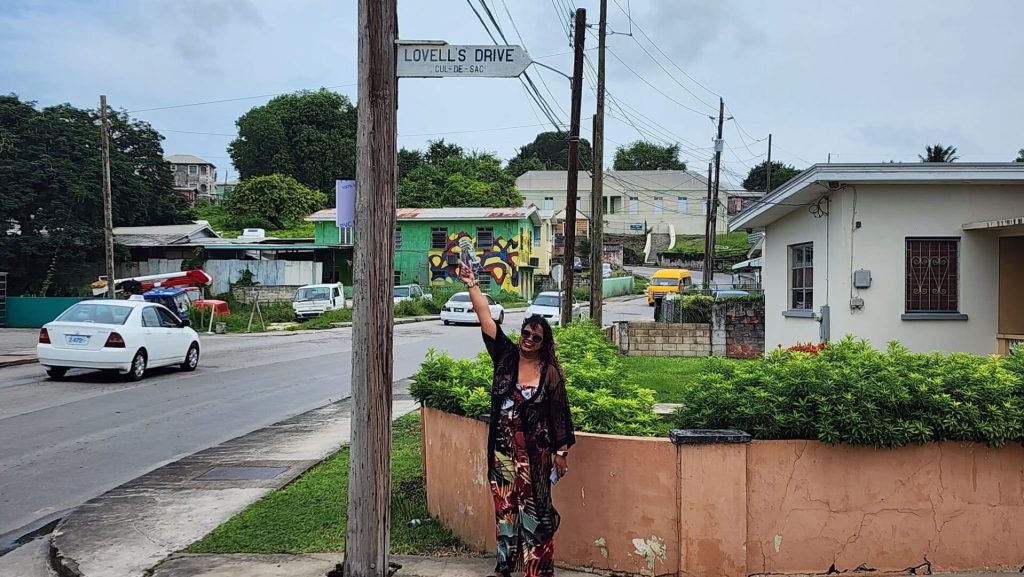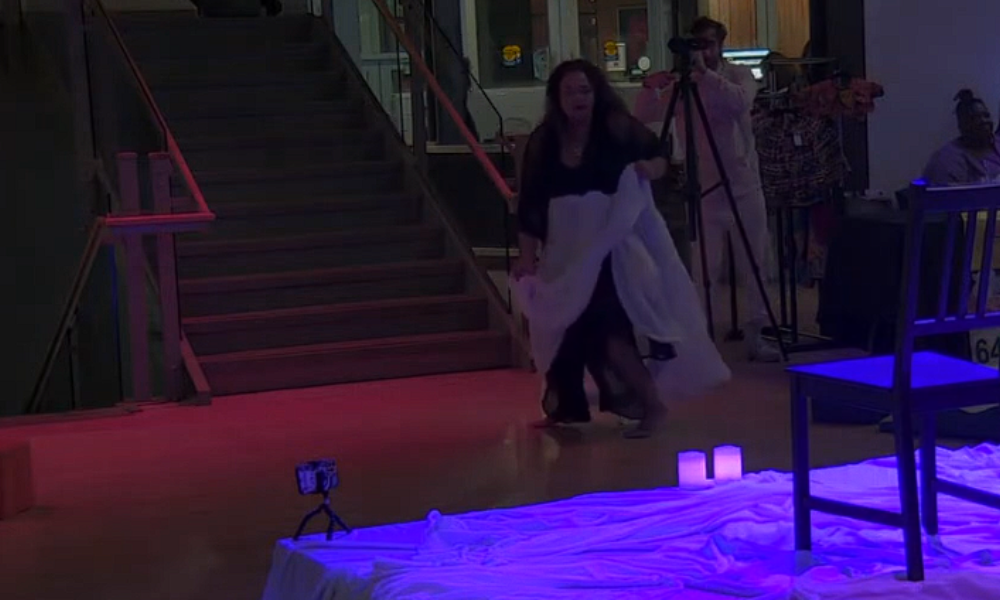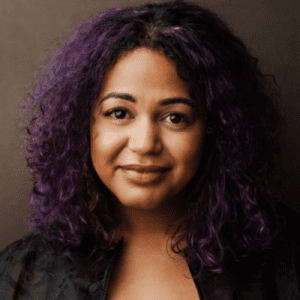We caught up with the brilliant and insightful Raechele Lovell a few weeks ago and have shared our conversation below.
Hi Raechele , appreciate you sitting with us today to share your wisdom with our readers. So, let’s start with resilience – where do you get your resilience from?
Resilience, for me, is deeply rooted in my identity and my lineage. I get it from the powerful womxn in my life who have faced unimaginable adversity and still found ways to survive, to love, and to create. My paternal grandmother, who is about to turn 101, is a living example of that strength. She endured the weight of colonialism, raised generations, and never lost her sense of purpose or fiery spirit.
My resilience is also connected to my work as a Black, bi-racial womxn in the arts, navigating spaces that often weren’t designed for me. It comes from a deep innerstanding that my voice, my body, and my story hold power, and that I am here to create space not just for myself, but for others who have been marginalized. My work in decolonial praxis is about reimagining and rebuilding structures, and resilience is at the heart of that—it’s the fuel that drives change, that helps me show up, even when the world feels like it’s crumbling.
And when things get really tough, I always return to movement, to my art. Dance is where I process, where I heal, and where I find the strength to keep pushing forward. It’s a continuous cycle of resilience, renewal, and revolution.
I’ve always believed that resilience is less about where you get it from and more about how you cultivate it through life’s experiences. For me, it’s a combination of lessons from my family, personal challenges, and a constant willingness to adapt. My lived experience has always been my foundation, teaching me early on that setbacks are just setups for comebacks. But beyond that, resilience also comes from my own inner drive—I’ve faced situations where giving up seemed like the easier option, but I’ve learned to dig deep and trust that I’m capable of overcoming adversity. I see resilience not just as bouncing back, but as growing stronger every time I practice it

Appreciate the insights and wisdom. Before we dig deeper and ask you about the skills that matter and more, maybe you can tell our readers about yourself?
I’m Raechele Lovell, a multi-disciplinary artivist, choreographer, producer and the Executive Artistic Director of DiverseWorks Co., a space where artistic expression, decolonial praxis, and social justice meet. My work is rooted in dismantling systems of oppression through the power of movement, storytelling, and community engagement. What excites me most about the work I do is how deeply it resonates with both personal healing and collective liberation. Every step, every gesture carries the weight of my ancestors, while also offering a vision for a more equitable and just future.
My journey with movement began at an early age, shaped by the rhythms of my ancestors, particularly through my father’s legacy, Traces Steel Band. It was here that I was first exposed to and fell in love with dance, a love that deepened as I pursued formal dance training at Eastwood Collegiate and Randolph College for the Performing Arts. Throughout my youth, I was fortunate to have mentors like Natalie Sebastian and Brooke Myers at Dance Adventure, who held space for me, offering me the guidance and encouragement I needed to thrive in the arts.
Life has a way of pulling us back to where we started, and in recent years, I’ve returned to my born region on the Halidman’s Tract, colonially known Kitchener-Waterloo, to be in closer proximity to my elderly parents as they were both sickly and quickly approaching the end of their lives. This return has been bittersweet—on one hand, I’ve been met with the same systemic challenges I faced as a young racialized artist but on the other, it’s been a powerful opportunity to rebuild and contribute to the community that shaped me.
As a mother and educator, my career has evolved, moving from a performance career into teaching. I quickly grew into a respected competitive coach and national adjudicator, helping young dancers develop not just technical skills but confidence in their own artistry. When the pandemic hit, like many artists, I found myself navigating a world that suddenly deemed us ‘non-essential,’ despite how deeply we all turned to art to carry us through the lockdown’s darkest times. Teaching Zoom classes six days a week nearly stole my creative spirit. I longed for the grounding that comes from having a space to create, to move, to express.
It was during this time that I found renewal through the MT Space Arts Exchange Program, where I had the opportunity to incubate my company, DiverseWorks Co., and what would become the Emergent apprenticeship program, alongside Samantha Patrick—an incredible dancer I mentored when she was a teenager. Emergent is a direct response to the need for greater representation in the arts, particularly in our local ecology. Through this program, we use an afro-centric approach to training predominately racialized and marginalized youth, preparing them to lead within a decolonial framework, while also giving them the tools to build their careers. Seeing how far our first cohort of apprentices has come, from securing dance programs at universities to taking on professional dance opportunities, has become one of the most rewarding experiences of my career and a core foundation of DiverseWorks.
DiverseWorks has also become a home for innovation in dance. With the support of collaborators like my childhood mentor, Natalie Sebastian and other incredible artists I’ve met since like Lily Gyamfi-Kumanini, we’ve built a company focused on transformative arts practice. We’ve been able to break barriers and offer space for marginalized artists thanks to the support of the Waterloo Region Community Foundation’s Racial Equity Fund, which helped fund the Emergent program.
At DiverseWorks, we’ve been fortunate to bring together powerful voices and projects that challenge the status quo in the arts sector. Our anti-Black racism in the arts panel sparked crucial conversations about the systemic barriers that Black artists face in Canada. We also presented our first short film at the Guelph Dance Screen Dances Festival, which showcased the deep connection between movement and narrative. Collaborations with The Kween Company, and our co-creation of The Meeting Place with Esie Mensah Creations for the Impact23 festival, have pushed us further into exploring where decolonial art meets public discourse.
My journey into decolonial praxis was also deeply shaped by my residency with d’bi young anitafrika at the Ubuntu Decolonial Arts Centre, where I had the privilege of developing my decolonial methodology alongside a circle of incredible practitioners from across Canada. This experience, funded by the Canada Council for the Arts, was foundational in shaping the DiverseWorks Decolonial Praxis, a framework that we continue to integrate across all our programming and artistic work.
And then there’s Uncovering Roots—a project that’s deeply personal to me and the crown jewel of our current work. Uncovering Roots began with a commission from Black & Free, but is evolving into a major production. It’s a multimedia, interdisciplinary dance-theatre project that examines my family’s connection to the brutal hxstory of chattel slavery at Drax Hall Plantation in Barbados, and the legacy of colonialism that continues to shape not only my identity, but the wider diasporic experience and the so-called ‘Canadian’ identity.
This project doesn’t just trace hxstory—it confronts it head-on. We delve into deindustrialization, emancipation, and the ongoing fight for reparations, using movement as a medium to express the tension between freedom and bondage, past and present. Directed by the visionary Lisa Karen Cox, Uncovering Roots has been embraced by DéPOT, an international research collective focused on the politics of deindustrialization, giving the work an even broader global platform.
We recently had the opportunity to present the creative methodology behind Uncovering Roots at the 8th Caribbean Symposium on History and Genealogy in Anguilla, where we shared the project’s rich research and artistic exploration of decolonization. This symposium was a key moment for us, allowing us to not only present the work but also engage in meaningful dialogue around its role in connecting hxstory, art, and social justice.
Following the symposium, the Creative Process Blog from Phase 1 of Uncovering Roots will be presented in an upcoming exhibit of Black and Free at the Waterloo Region Museum, and we’re set to travel to Barbados in late October to continue researching and developing the dramaturgy for Phase 2.
What makes Uncovering Roots especially significant is its capacity to hold space for intergenerational trauma and healing. The project includes archival research, oral histories, and performance as a way to honour my ancestors while shining a light on the global implications of colonialism.
Most recently, DiverseWorks has been invited to join the 2024-25 Balancing Act Program as a Level UP! Strategy Partner. This initiative focuses on nurturing a culture of care within the arts by creating inclusive spaces that support artist caregivers. For DiverseWorks, this partnership aligns perfectly with our mission to empower marginalized artists, many of whom, including myself, are juggling the responsibilities of caregiving alongside their creative work. Through peer-to-peer learning and strategic collaborations, we look forward to shaping policies and practices that ensure our artists have the support they need to thrive both personally and professionally.
This journey will all culminate in June 2025 at the DéPOT Assembly in Paris, where Uncovering Roots will make its international debut, weaving together the threads of history, identity, and liberation. The Emergent apprentices will also be integrated into the project, gaining hands-on experience as part of their training, as we continue to build a future that merges art and activism.

Is there a particular challenge you are currently facing?
The number one obstacle I’m currently facing is the overwhelming weight of white supremacy and colonialism and how they continue to oppress me, my work, and the communities I serve. These systems have a profound and direct impact on my ability to thrive as a racialized artist and mother. They’re not just abstract concepts; they manifest in everyday realities—like the rising cost of living in the Waterloo Region and across Canada, which makes it nearly impossible to survive, let alone produce meaningful art.
White supremacy and colonialism have created barriers that keep people like me in a state of precarity. The housing crisis, the inflation of basic necessities, and the systemic inequities within the arts make it harder for marginalized artists to gain footing. As a Black bi-racial womxn, these challenges are compounded by the expectations of caregiving and the constant emotional labor of fighting for a place in a sector that wasn’t built for us. Every step forward requires battling gatekeepers and systems that were never designed with racialized artists in mind.
The financial pressure is immense, especially as I try to balance providing for my family with creating art that pushes against these very oppressive structures. The cost of living crisis has been exacerbated by policies and practices rooted in capitalism and white supremacy that continue to strip resources away from marginalized communities. Housing is increasingly unaffordable, especially for artists, and the arts sector itself is underfunded, forcing us to constantly hustle for resources that should be available equitably.
To address these challenges, I’m focusing on continuing to build DiverseWorks as a space of resistance. Our work is about more than just surviving; it’s about creating pathways for others who face these same challenges. Through the Emergent program, the decolonial praxis I developed at the Ubuntu Decolonial Arts Centre, and my ongoing partnerships, I’m trying to cultivate sustainable spaces where racialized artists can grow without being suffocated by the weight of these oppressive systems. But it’s not easy. The constant struggle to secure funding, support, and basic resources is exhausting.
I believe that part of the solution lies in continuing to fight for systemic change, advocating for arts funding that recognizes the impact of colonialism and white supremacy on racialized artists, and pushing for policies that provide affordable housing, healthcare, and financial security for marginalized communities. Until we dismantle these systems, racialized artists will continue to bear the brunt of these crises. But we won’t stop fighting, and my work will continue to hold space for that resistance, even as the weight grows heavier

